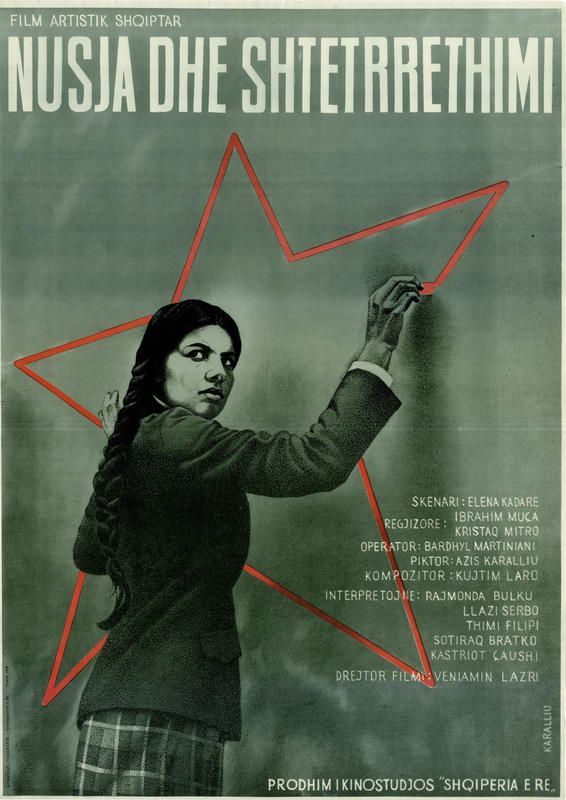The Directors and Advisors of the Board of the Albanian Cinema Project (ACP) are extremely troubled by the proposed ban on the screening of Kinostudio era films put forth under the name of The Institute for Communist Crimes.
ACP, an international coalition of concerned audiovisual archivists, filmmakers, and cinephiles, came together in 2012 to bring public awareness to the plight of Albania’s underfunded and decrepit audiovisual archives. We urge the Albanian government to properly safeguard these national treasures to ensure that Albanian film history enters film and media studies curricula globally. We are strongly committed to this mission. A ban on any collection of Albanian films would be a detriment to understanding and appreciating the Albanian film legacy.
Since 2012, we have enabled the restoration of three historically significant Albanian feature films, one short film, and one ethnographic film, fulfilling our goal to preserve “Five Films in Five Years.” These films have since screened in cinemas, film festivals, community centers, and university halls from Thailand to Paris to Tirana to New York. The world beyond the borders of Albania is just beginning to learn about and appreciate the rich cinematic history of Albania.
In 2016 ACP made its first steps to broaden the coalition to include Western Balkan audiovisual heritage. We gathered over 70 experts and archivists from India, the UK, Switzerland, the US, Hungary, Albanian, Macedonia, Montenegro, Kosovo, Serbia, Slovenia, Croatia, Bosnia-Herzegovina. For two weeks we debated and discussed the problems that face film archives in former communist countries. There was unanimous agreement that these films must not only be preserved, but restored, and screened for new audiences.
ACP has received support and funding from the US State Department, the Albanian Ministry of Culture, the International Federation of Film Archives, the international Association of Moving Image Archivists, The Internet Archive, the World Bank Art Program, and the Film Foundation. Martin Scorsese through The Film Foundation had this to say about international understanding and cinematic heritage:
The Film Foundation recognizes and applauds the Albanian Cinema Project’s mission of preserving and enriching our shared cultural legacy. It is crucial that the world’s archival community support these efforts to develop the preservation and digitization skills of film professionals in this region, and at the same time, to broaden international understanding of the Balkans and its cinematic heritage.
As committed professionals, we donate our time, energy, and expertise to ensure that these films are restored and exhibited in a context that allows the rich and complex legacies of communist-era film production to be addressed. ACP is firmly committed to educating global audiences through this work. In order to confront and come to terms with this past, it must be visible and available to public audiences.
The push to censor these films, led by Agron Tufa and Erald Kapri, is short-sighted and goes against everything that archivists and historians of our shared global heritage stand for. The UNESCO constitution states, in part:
Since wars begin in the minds of men, it is in the minds of men that the defences of peace must be constructed… the wide diffusion of culture, and the education of humanity for justice and liberty and peace are indispensable to the dignity of man and constitute a sacred duty which all the nations must fulfil in a spirit of mutual assistance and concern… believing in full and equal opportunities for education for all, in the unrestricted pursuit of objective truth, and in the free exchange of ideas and knowledge…
Drawing on the Universal Declaration of Human Rights and other instruments, the United Nations Human Rights Council has drawn attention to the critical importance of preserving archives and historic memory, citing as a principle that every people has the inalienable right to know the truth about past events and adding that:
The right to know implies that archives must be preserved [and that measures should be taken] to prevent any removal, destruction, concealment or falsification of archives… access to archives should be facilitated in the interests of historical research, subject to reasonable restrictions aimed at safeguarding privacy… formal requirements governing access may not be used for purposes of censorship.
We the members of the Albanian Cinema Project strongly urge the Albanian government to keep these archives open to the public and to allow these films to be screened and discussed.
Mark Cousins Nancy McLean
Elvira Diamanti Veton Nurkollari
Dennis Doros Stephen Parr
Iris Elezi Paul C. Spehr
Ray Edmondson Elian Stefa
Ana Grgic Dan Streible
Fatmir Koci Russ Suniewick
Reto Kromer Roxanne Suratgar
Thomas Logoreci Eriona Vyshka
Regina Longo Ken Weissman
Andrea McCarty Caroline Yeager
